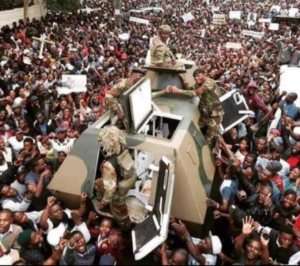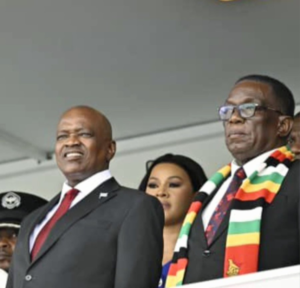WHY THE 2017 COUP WAS MORE THAN JUST A POWER GRAB
Former Central Intelligence Organisation (CIO) deputy Director-General Lovemore Mukandi says the 2017 coup in Zimbabwe was not just about protecting the positions of President Emmerson Mnangagwa and his military allies. He explains that one of the reasons behind the coup was to avoid facing justice for the Gukurahundi genocide, which took place in the 1980s.
The late former president Robert Mugabe is known as the main person behind Gukurahundi. Mnangagwa, who was the State Security Minister at the time, played a major role in enforcing the violence. Other government ministers, including Enos Nkala, Maurice Nyagumbo, Nathan Shamuyarira, Simbi Mubako, Sydney Sekeramayi, Dzingai Mutumbuka, and Frederick Shava, were also involved.
Some members of Zapu, a political party that was in opposition at the time, defected to Zanu and became strong supporters of Gukurahundi. These defectors included Callistus Ndlovu, John Mbedzi, and Mark Dube, who became key figures in the violence. In 2018, Mnangagwa declared Mbedzi a national hero, even though Vice President Kembo Mohadi, who was a victim of Gukurahundi and a political rival of Mbedzi, was not happy about this decision.
Lovemore Mukandi states that the people involved in Gukurahundi, like Mnangagwa and the military commanders, wanted to avoid being punished for their actions. This is why they were so determined to stay in power. Constantino Chiwenga, who is now the Vice President of Zimbabwe, was also involved in Gukurahundi. He was the commander of 1 Infantry Brigade in Bulawayo during the 1980s when the violence occurred. Other military leaders also played important roles in the genocide.
Mukandi says that leaders who use military power to take control of a country and avoid prosecution for human rights abuses are not unusual. Mnangagwa is a clear example of this. After the military coup in 2017, he became the President of Zimbabwe. Mukandi suggests that the coup happened to prevent Mugabe from appointing someone who might hold the military and government leaders accountable for their actions during Gukurahundi.
Before the coup, Mnangagwa was Vice President but was dismissed by Mugabe just before the military took control. The coup leaders forced Mugabe to resign, and Mnangagwa returned to power. Many of the military leaders who helped with the coup were given important positions in the new government.
Although there are claims that Sekeramayi, who was rumored to be Mugabe’s choice for successor, was not involved in Gukurahundi, Mukandi disagrees. He says there is evidence that Sekeramayi was one of the agitators, meaning he would not have prosecuted those responsible for the violence even if he had taken over as president.
The 2017 coup in Zimbabwe shows how dangerous it can be when military leaders get involved in politics. It highlights the risk that leaders will use force to stay in power and avoid being held accountable for their crimes. Human rights abuses are often ignored or excused when military leaders take over, and this can lead to further suffering for the people of the country.
The Zimbabwean military, which had a long history of human rights violations, took control of important government institutions during the coup. Mugabe was forced to resign, and Mnangagwa, along with the military, took over the government. Those involved in the coup were rewarded with powerful positions in the new government, showing that their main aim was to protect themselves from any legal consequences for their actions during Gukurahundi.
This situation in Zimbabwe serves as a warning to other countries about the dangers of allowing military leaders to become involved in politics. It shows how leaders can use military power to hold onto control and avoid facing justice for human rights abuses. This can have long-lasting effects on the country, making it harder for the people to trust their government and its leaders.



